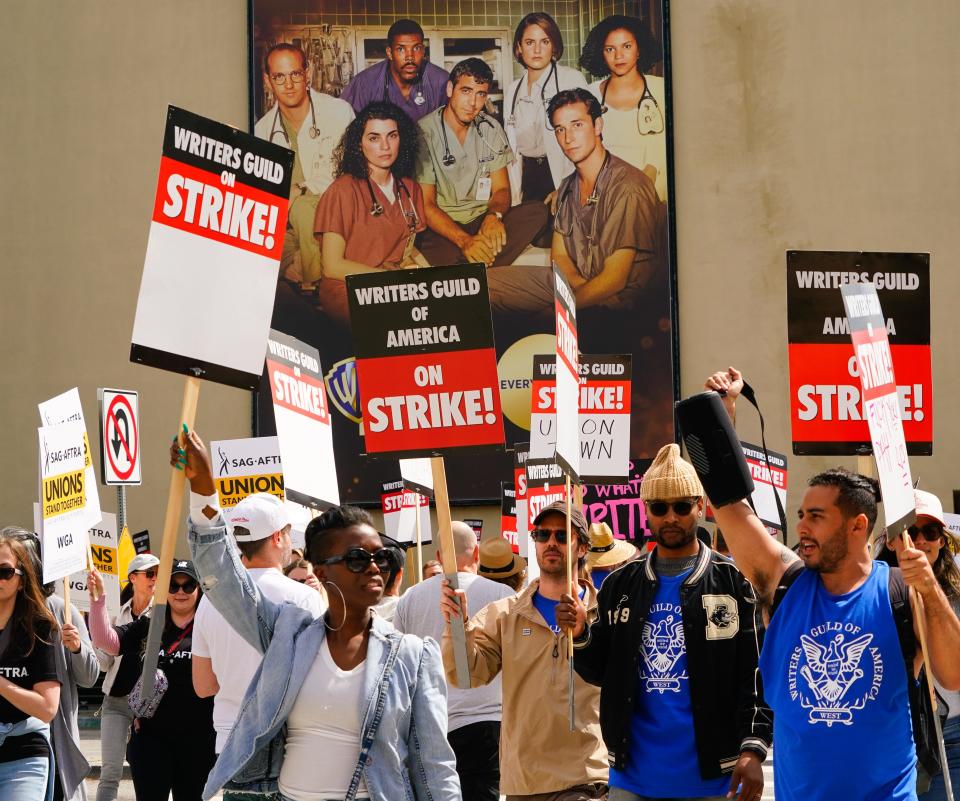Broadcast television feeling the effects of the Writers Guild strike

Life, you may have noticed, is rarely fair.
That’s become clear now, as the Writers Guild strike settles in, leaving an uneven impact. At one extreme are the movie studios, which pile up scripts and projects far in advance. For now, everything seems unchanged — same superheroes, supervillains, super collisions. In the middle are the streamers and a few cable networks. They try for the movie-studio approach. At the other end are the commercial broadcast networks. For them, the effects are instant and jolting.
On the first full day of the strike (May 2), their late-night shows — Kimmel, Fallon, Colbert, Meyers — lapsed into reruns. So did Comedy Central’s “The Daily Show.”
Four days later, “Saturday Night Live” dropped what would have been one of its biggest episodes, with Pete Davidson as host. “SNL” had planned two more new shows; instead, its season seems to be over.
And now come the announcements of the new fall line-ups — usually a festive time. Not this year; CBS has already announced that it will have only two new shows this fall — a “Matlock” reboot with Kathy Bates and a “Good Wife”/”Good Fight” spin-off with Carrie Preston’s Elsbeth character.
Other networks are likely to that that same approach, with fewer new shows. (When a strike ends, it’s quicker to re-start an old show than launch a new one.) They also may try more reality.
For now, life seems good for PBS (whose few scripted shows are made overseas, far in advance) and for the nonfiction cable channels. The Discovery people are looking comfortable.

Yes, there have been writers’ strikes in the past. They were in 2007-8 (100 days), 1988 (153 days) and 1981 (about 90). Each, like the current one, was propelled by changes in technology.
But this time, there are key differences. In the past:
More games and reality
These are already a key part of summer but could grow in the fall.
CBS has announced plans for two primetime games — produced and hosted by actors Josh Duhamel and Jaime Camil. CW is taking “FBoy Island,” a summertime trifle on a streaming network, and putting it in prime time next season … plus a spinoff, “FGirl Island.”
And ABC has reversed itself: A year after letting “Dancing With the Stars” drift off to Disney+, it will bring the show back to the network (while also being on Disney+) this fall.
Overseas shows
CW has made this a specialty — usually for the summer but also as part of its fall schedule during the pandemic. There have been some shows from England and one from France, but the most successful were Canadian — “Coroner” and “Burden of Truth.”
So far, the network has announced three overseas shows for this summer, but none for the fall.
Starting May 29, Mondays will pair the British “The Rising” (a dead woman tries to solve her murder) and the Australian “Barons” (true story of a surfer friendship that became a corporate competition). Also coming (but not yet scheduled) is “Son of a Critch,” a Canadian comedy that the CW hopes will be compared to “Schitt’s Creek.”
And more
After the COVID pause, some networks borrowed shows from streamers or cable (“L.A.’s Finest,” “Tell Me a Story,” etc.). CBS also took a couple shots at reviving its Sunday movies.
Other possibilities range from unscripted variety shows (in the Ed Sullivan style) to more news and sports. Or they could simply settle the strike. We’ll see.
This article originally appeared on Mansfield News Journal: Broadcast TV already impacted by Writers Guild strike

